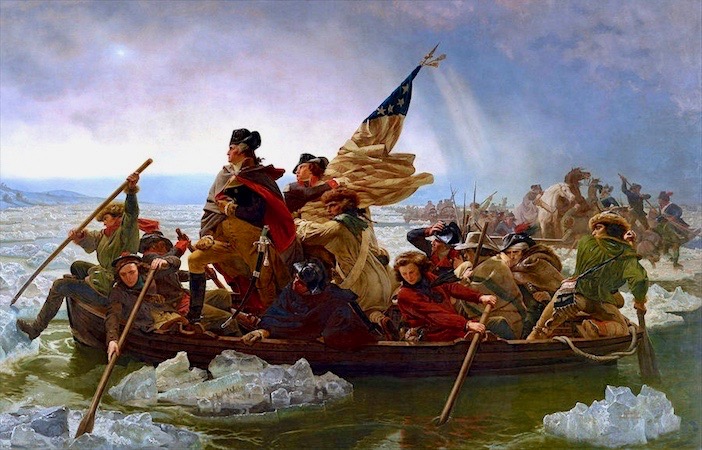
A: Colonial Period and Independence
58. What is one reason colonists came to America?
▪ freedom
▪ political liberty
▪ religious freedom
▪ economic opportunity
▪ practice their religion
▪ escape persecution
59. Who lived in America before the Europeans arrived?
▪ American Indians
▪ Native Americans
60. What group of people was taken to America and sold as slaves?
▪ Africans
▪ people from Africa
61. Why did the colonists fight the British?
▪ because of high taxes (taxation without representation)
▪ because the British army stayed in their houses (boarding, quartering)
▪ because they didn’t have self-government
62. Who wrote the Declaration of Independence?
▪ (Thomas) Jefferson
63. When was the Declaration of Independence adopted?
▪ July 4, 1776
64. There were 13 original states. Name three.
▪ New Hampshire
▪ Massachusetts
▪ Rhode Island
▪ Connecticut
▪ New York
▪ New Jersey
▪ Pennsylvania
▪ Delaware
▪ Maryland
▪ Virginia
▪ North Carolina
▪ South Carolina
▪ Georgia
65. What happened at the Constitutional Convention?
▪ The Constitution was written.
▪ The Founding Fathers wrote the Constitution.
66. When was the Constitution written?
▪ 1787
67. The Federalist Papers supported the passage of the U.S. Constitution. Name one of the writers.
▪ (James) Madison
▪ (Alexander) Hamilton
▪ (John) Jay
▪ Publius
68. What is one thing Benjamin Franklin is famous for?
▪ U.S. diplomat
▪ oldest member of the Constitutional Convention
▪ first Postmaster General of the United States
▪ writer of “Poor Richard’s Almanac”
▪ started the first free libraries
69. Who is the “Father of Our Country”?
▪ (George) Washington
70. Who was the first President?*
▪ (George) Washington
B: 1800s
71. What territory did the United States buy from France in 1803?
▪ the Louisiana Territory
▪ Louisiana
72. Name one war fought by the United States in the 1800s.
▪ War of 1812
▪ Mexican-American War
▪ Civil War
▪ Spanish-American War
73. Name the U.S. war between the North and the South.
▪ the Civil War
▪ the War between the States
74. Name one problem that led to the Civil War.
▪ slavery
▪ economic reasons
▪ states’ rights
75. What was one important thing that Abraham Lincoln did?*
▪ freed the slaves (Emancipation Proclamation)
▪ saved (or preserved) the Union
▪ led the United States during the Civil War
76. What did the Emancipation Proclamation do?
▪ freed the slaves
▪ freed slaves in the Confederacy
▪ freed slaves in the Confederate states
▪ freed slaves in most Southern states
77. What did Susan B. Anthony do?
▪ fought for women’s rights
▪ fought for civil rights
C: Recent American History and Other Important Historical Information
78. Name one war fought by the United States in the 1900s.*
▪ World War I
▪ World War II
▪ Korean War
▪ Vietnam War
▪ (Persian) Gulf War
79. Who was President during World War I?
▪ (Woodrow) Wilson
80. Who was President during the Great Depression and World War II?
▪ (Franklin) Roosevelt
81. Who did the United States fight in World War II?
▪ Japan, Germany, and Italy
82. Before he was President, Eisenhower was a general. What war was he in?
▪ World War II
83. During the Cold War, what was the main concern of the United States?
▪ Communism
84. What movement tried to end racial discrimination?
▪ civil rights (movement)
85. What did Martin Luther King, Jr. do?*
▪ fought for civil rights
▪ worked for equality for all Americans
86. What major event happened on September 11, 2001, in the United States?
▪ Terrorists attacked the United States.
87. Name one American Indian tribe in the United States.
[USCIS Officers will be supplied with a list of federally recognized American Indian tribes.]
▪ Cherokee
▪ Navajo
▪ Sioux
▪ Chippewa
▪ Choctaw
▪ Pueblo
▪ Apache
▪ Iroquois
▪ Creek
▪ Blackfeet
▪ Seminole
▪ Cheyenne
▪ Arawak
▪ Shawnee
▪ Mohegan
▪ Huron
▪ Oneida
▪ Lakota
▪ Crow
▪ Teton
▪ Hopi
▪ Inui

